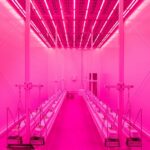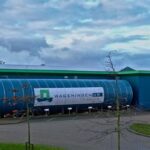Plant factory for demonstrational purposes
Background:
Wageningen University & Research (WUR) has a unique research facility in Bleiswijk, in the heart of the Municipality of Lansingerland, the second largest greenhouse horticultural municipality in the Netherlands. The unit of “Greenhouse Horticulture” investigates all aspects of horticultural production in its 7500 m2 of greenhouses and, together with the business community, science and government, translates the results into application-oriented research and innovation processes. The research facility includes greenhouses for sustainable crop protection research, energy-saving experimental greenhouses, measurement setups for greenhouse materials research and early warning of crop stress, two innovation and demonstration centers (on energy and water strategies).
At the end of 2020, a new vertical farm facility was built and constitutes one of the pilot case studies within the FoodE project. It serves as research, educational and demonstrational center, trying to answer questions regarding the most suitable crop choice, climate and cultivation strategy in commercial vertical farming.
The Municipality of Lansingerland has been working closely with WUR for 15 years (as well as with other leading research institutions in greenhouse horticulture) and wishes to further develop its position as a knowledge-intensive municipality focusing on sustainable greenhouse horticulture. It is currently collaborating with entrepreneurs and residents on a “Horti Science Vision”, which should form the basis for guiding greenhouse horticulture research and future plans on topics such as education, employment and space.
Main Services and Activities:
The indoor farm is a multi-functional space for research, education, outreach activities as well as B2B projects. Together with the Municipality of Lansingerland (NL), the pilot is a demonstrational center for local growers, producers, suppliers as well as for the civil society.
In particular, the pilot is in charge of the following activities:
- Research activities. Thanks to the full climate control, the vertical farm is an optimal research tool and will be used for the investigation of production recipes, light spectrum, new crops and many other topics. This research is (also) intended to unveil new insights for horticulture in greenhouses. The vertical farm was designed with a high airtightness and features numerous electricity and flow counters. This allows researchers to determine: the energy balance, the water balance, the CO2 balance within experiments and determine the effects and efficiency of different climate recipes.
- Educational and training activities. Possibility for master students and PhD students to collaborate on projects and perform their thesis and internships, in collaboration with Wageningen university as well as international universities (included those within the FoodE consortium). The pilot team also facilitates training and dissemination workshops on closed plant production which will be accessible to local growers and other agricultural specialists.
- B2B collaborations. The vertical farming is also used as a service for the industry (e.g., growers, producers of starting materials, suppliers of fertilizers and consumables, substrate, energy, installation companies in the field of climate, water, energy) to test new products and protocols and to formulate input for development of innovative business model(s) (in connection with WP5).
- Dissemination and outreach activities:
- Development of dissemination materials (e.g., videos and factsheets) aimed at citizens, and that reflect the social impact of vegetable production in high-tech controlled environment.
- Organization of a large public event for residents of the region Rotterdam-The Hague and international public, in the occasion of the MyLocalFoodE initiative. The aim is to provide citizens and kids with an insight into the innovative nature of vertical farming and indoor vegetable production in general, and the role they play in the current economic and environmental scenario. During the MyLocalFoodE event “Waar komt ons voedsel vandaan?” (watch the video) the Municipality and WUR opened their doors to children and parents to show them first-hand how fruit and vegetables are produced in controlled environments and what innovative and environmentally sustainable systems are like, in order to cope with current and future challenges.
- Organization of a conference open to researchers/academic, students and professionals, taking the advantage of the synergy between Wageningen Research and the In October 2023, WUR and the Municipality will host the conference “Exploring the Future of Horti Science: feeding and greening cities in 2050”. More details will come, stay tuned on FoodE’s social media!
External publications featuring the pilot:
- Resources for plant-based food: Estimating resource use to meet the requirements of urban and peri-urban diets
- Towards more resilient, community-driven urban food systems: design and implementation of case studies in European cities
- How to make ‘resilient citizen-driven food systems’ happen
- Vertical Farming is heel nuttig als onderzoekstool
- Meer productie en kwaliteit in urban farming
Relevant videos:
In collaboration with FoodE partners:
Gemeente Lansingerland (NL), Wageningen University & Research (NL), University of Bologna (IT), Institut des Sciences et Industries du Vivant et de l’Environnement – Agro Paris Tech (FR), Tasen Microgreen AS (NO) and Flytech SRL (IT)











